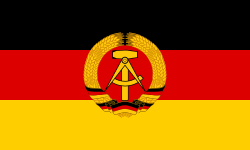| Deutscher Fecht-Verband | |
 | |
| Sport | Fencing |
|---|---|
| Membership | 6,584 (1988) |
| Abbreviation | DFV |
| Founded | 20 July 1958 |
| Headquarters | East Berlin, German Democratic Republic |
| Closure date | 8 December 1990 |
| | |
The Deutscher Fecht-Verband (DFV) was the organ of the larger Deutscher Turn- und Sportbund responsible for governing the sport of fencing in East Germany. One of the smaller sports associations in the nation, in 1988 the organization had 6,584 registered athletes and 673 trainers. After German reunification in late 1990 the DFV was absorbed by the German Fencing Federation (DFB). [1]
Contents
Though its membership was comparatively small, the DFV produced several prominent athletes, including Olympians Udo Wagner, Mandy Niklaus, and Klaus Haertter.
